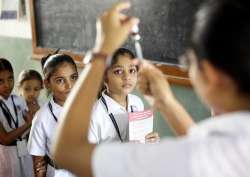India, Indonesia far behind in measles vaccination: WHO
The World Health Organization noted that the vaccination drive in both the countries was hampered due to misconceptions and misinformation.

The World Health Organization (WHO) today said that India and Indonesia are far behind in their battle against measles and account for over 90 per cent of the unvaccinated children in the Southeast Asia.
The world body noted that the vaccination drive in both the countries was hampered due to misconceptions and misinformation.
According to the Southeast Asia Regional Office of the World Health Organization (WHO SEARO), 3.1 million children in India and 1.1 million in Indonesia did not get measles vaccination in 2016. Together they account for 91 per cent of unvaccinated children in the region, with India alone accounting for 67 per cent of the children missing immunisation.
Health officials have expressed concern about the situation as measles still kills an estimated 134,200 children worldwide every year, which includes more than 54,500 in Southeast Asia.
"There is no global goal or big fund to eradicate measles, so countries should allocate funds for it, especially India and Indonesia, where the largest numbers of unimmunized children reside," Pem Namgyal, the WHO SEARO director of family health, gender and life course, told PTI on the sidelines of the office's 70th regional committee meeting.
He said the two countries were still far behind the Maldives and Bhutan, which have been declared free of measles.
India and Indonesia, home to 1.3 billion and 261 million people respectively, are Southeast Asia region's most-populous countries.
One of the largest misconceptions about the measles vaccination, usually called MMR or MR vaccines, is that it can cause autism.
During phase 1 of the MR campaign in India, some negative messages were floated through social media (WhatsApp and Facebook) in Karnataka, Tamil Nadu and Puducherry. There was some coverage of these negative social messages on local television channels as well.
"This leads to some hesitancy to accept MR vaccine in these states," Namgyals said.
"Since the campaign was still ongoing and the state governments realised that this could negatively affect the coverage, they took immediate actions which included editorials in newspaper stating benefits of MR vaccination campaign advocacy campaign, involvement of local celebrities to counter the wrong messages and social media messaging targeting negative rumours," he said.
"The state governments also decided to extend the duration of the MR campaign in states. As a result of all these actions, high coverage was achieved in all the states. Learning from this experience, India has put together a communication strategy for the next phase of MR campaign which is currently under implementation," he said.
In a predominantly Muslim country like Indonesia, there is also resistance due to the widespread view that the vaccine contains pork gelatine, which is forbidden in Islam. Namgyal, however, dismissed these misconceptions, saying the vaccine was harmless.